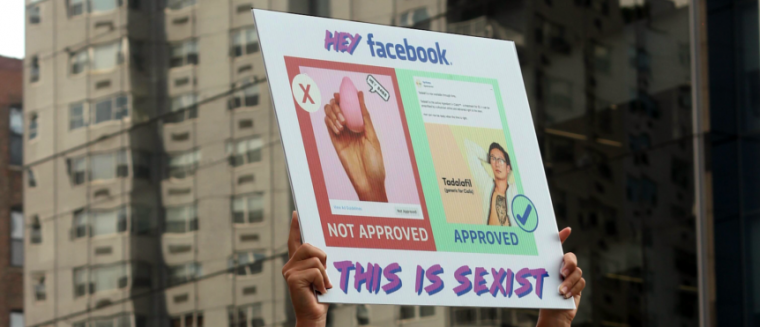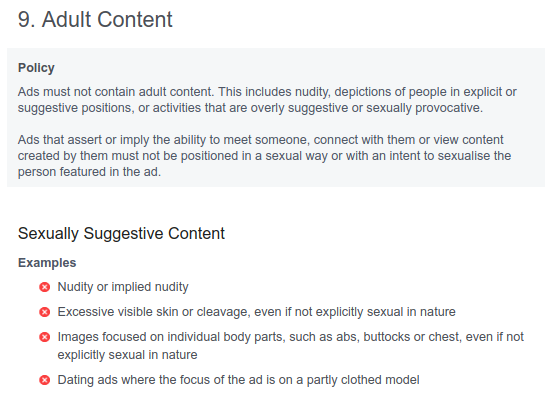
If you use Facebook heavily, it might come as a surprise that the platform says it prohibits adult content in ads. With everything from a constant stream of “boosted” posts from fitness models to erectile dysfunction ads and “how to initiate sex” ads aimed at brainwashing your wife showing up in timelines, this seems like a weird flex. But Facebook—along with other companies and organizations, like the NYC MTA—does have such a policy. Unfortunately, enforcement of this kind of policy tends to be wink-wink nudge-nudge for ads and services targeting straight male customers, but it’s often enforced sternly by-the-book for everyone else.

Facebook’s policy goes on to provide example images of prohibited content, which revolve in theory around nudity, “implied nudity,” and excessive skin/cleavage or focus on a particular body part “even if not explicitly sexual.” The problem is not so much with the policy as its uneven enforcement. Ads which clearly violate the stated policy—including but not limited to underwear companies or fitness models with tightly-cropped and suggestive poses, lots of skin, etc—routinely make it through, while ads for female-oriented sexual wellness products or educational posts, seemingly no matter how restrained, are stopped cold. So some companies in the sex tech area have now decided not to take such policy implementation lying down.
-
Facebook disapproved this innocuous ad for a Dame handheld vibrator.
-
Facebook approved this Manscaped ad—shave ‘em if you got ‘em, I guess?
-
Facebook refused to boost this educational blog post centered around communication and consent.
-
Facebook approved this Hims ad featuring a rather self-satisfied model who, one supposes, enjoys his Tadalafil.
-
The New York MTA refused to allow this Unbound advertisement in the subway.
-
These breast augmentation ads were plastered all over NYC subways.approvednotapproved
-
This ad for erectile performance enhancements, featuring a very on-the-nose droopy cactus, was approved by the New York MTA.
-
This ad for a Dame handheld vibrator was disapproved by the New York MTA.
Approved, not approved
Two woman-owned sexual wellness companies, Unbound and Dame Products, have started a campaign to address this discriminatory policy enforcement. The campaign’s website, approvednotapproved, encourages visitors to play a maddening guessing game in which they’re shown advertisements and asked to guess whether those ads were allowed. For now, the campaign mostly targets Facebook, Instagram, and the New York MTA (aka, metro or subway ads).
“[I’d like to see] when applicable, advertisers offer an ad category for ‘sexual health and wellness’ shown only to those 18-plus,” Janet Lieberman, CTO of Dame Products, told Ars. “[And I’d like to see] advertisers treat sexual wellness solutions for all sexes and genders equally in how they approve or deny advertisements, without applying their own viewpoint-specific filters on what is or is not wellness.”
In addition to the ongoing digital campaign, Dame and Unbound sponsored a protest this week on Facebook’s campus. The protest didn’t appear heavily attended, but the signage of those who did show up contained clear and direct messaging.
-
The homemade signs tended to be more political than the ones provided by Dame/Unbound.Dame/Unbound
-
Equally important, at any rate…Dame/Unbound
-
The “ad images” on this protester’s sign aren’t actually ads; they’re Facebook’s example images for what constitutes prohibited “adult content” in advertisement.Dame/Unbound
-
The homemade signs tended to be a lot more politicized than the ones provided by Dame/Unbound.Dame/Unbound
-
Despite doing a pretty impressive job of making their ads non-prurient, Dame and Unbound get regularly rejected from platforms like Facebook, Instagram, and the NYC subway.Dame/Unbound
-
Despite doing a pretty impressive job of making their ads non-prurient, Dame and Unbound get regularly rejected from platforms like Facebook, Instagram, and the NYC subway.Dame/Unbound
“We would have no issue with the current content guidelines that most platforms have regarding imagery and language if they were enforced consistently. We simply want the opportunity to direct interested consumers to our products using innocuous creative [ads], on par with or tamer than what they’re already seeing,” Liberman says. “Digital platforms in particular know a lot about who they’re targeting. My ads knew I was getting married before I was even formally engaged. We think it’s about time they use those tools to allow tasteful sexual wellness ads to be shown to the adults who will appreciate them.”
The heart of the two companies’ issue with various advertising boils down to gender bias—presumably unconscious—that unfairly penalizes advertisements targeted specifically to women. While this is a serious accusation, it shouldn’t be particularly surprising or hard-to-believe; studies demonstrating biases that favor men and penalize women are numerous and well-established.
Wait, what’s a “sexual wellness company?”
In this article, we refer to both Unbound and Dame Products as sexual wellness companies. There doesn’t seem to be a single well-defined and broadly understood word that refers to what they do, which mostly boils down to the manufacturing and sales of sex toys that are designed to be high-quality and body-appropriate, rather than tawdry or shocking. (As Lieberman put it, “ED medications or condoms might be the most relevant products for some, vibrators, lubricants, erotica, or educational materials might be the most impactful solutions for others—that only scratches the surface of the variety of sexual wellness products.”)
When we talked to Lieberman—an MIT alumna with experience in mechanical engineering and industrial design—she told us that a large part of the reason she co-founded Dame Products was the lower standard of design and engineering she saw in existing vibrators as compared to other consumer electronics. There was a contrast in the quality and design inherent in mainstream consumer products versus “novelties,” which is the category sex toys are typically listed under.
Although the two companies behind the “Approved, Not Approved” campaign clearly differ when it comes to their products’ style, both emphasize female-focused ergonomics and design, and they eschew the sort of anthropomorphic (read: it looks like a penis) designs that frequently descend well into the Uncanny Valley.
Ars readers (maybe like the Internet at large) tend to get pretty hot and bothered on both sides of the topic of family-friendly censorship, and we don’t expect those partisan reactions to be any different here. Some folks will undoubtedly say we’d all be better off with all the sex in all the places, and a few will probably think all of the ad samples above should be banned. Whichever side of that debate you find yourself on, it’s worth noting the clear selective bias. As “Approved, Not Approved” indicates, sexual content seems to be getting filtered or approved not on the basis of how tacky or tasteful, educational or pandering it is, but on whether or not it appeals to men.
https://arstechnica.com/?p=1544283

